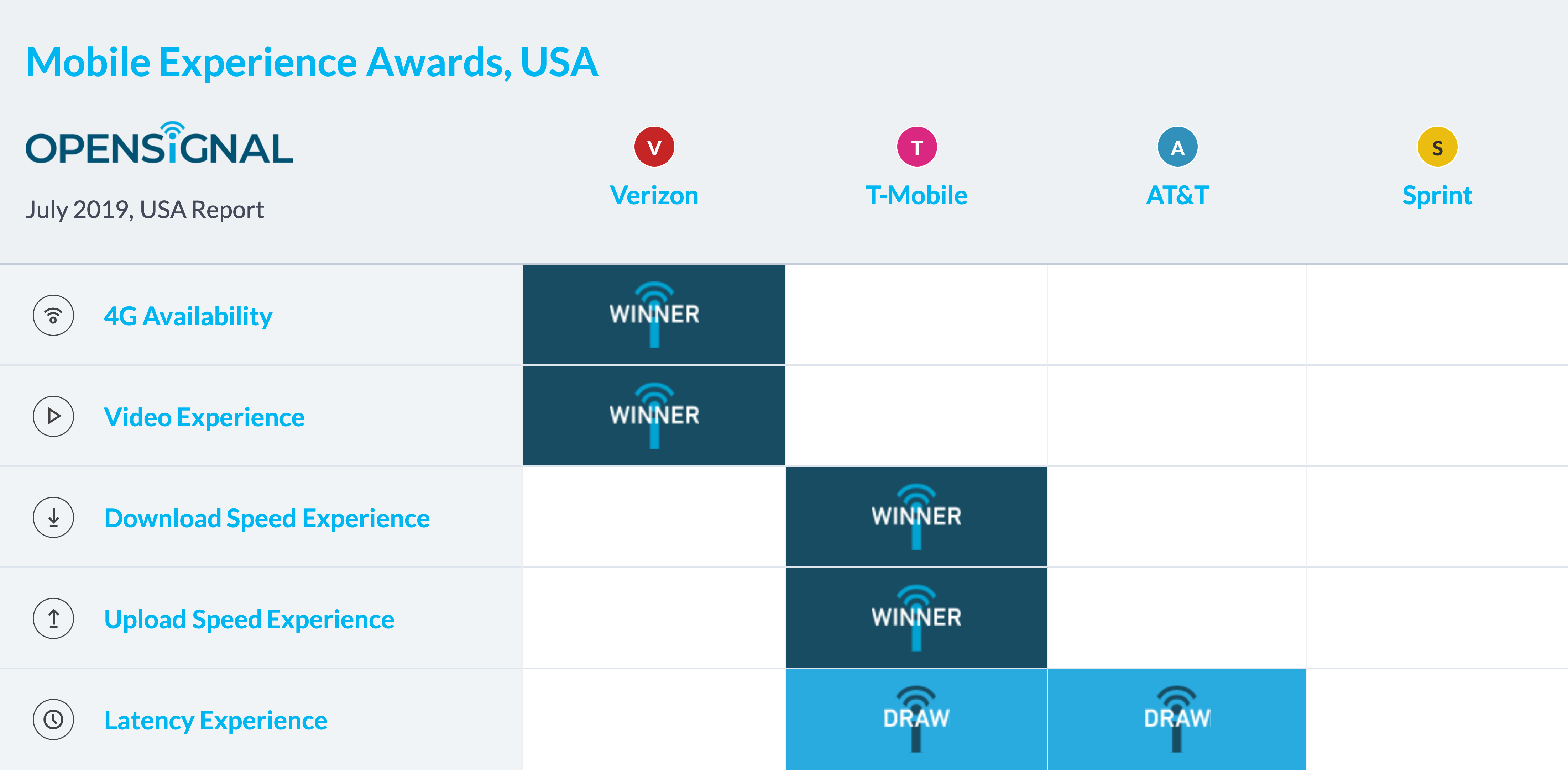Speeds and other performance metrics on LTE networks are still rising, even as carriers begin to roll out their 5G networks, according to the latest analysis from OpenSignal. Verizon saw a big bump in its video quality, which AT&T’s FirstNet-fueled network investments appear to be paying off with a jump in its download speed performance.
However, the device-based measurement company found that while carriers continue to invest in the performance of their LTE networks, the geographic expansion of those networks has plateaued.
OpenSignal said that it recorded increases in average download speed on every major operator’s network, and all four now have surpassed the 20 Mbps mark.
Among the report’s findings:
-OpenSignal said that “one of the most remarkable trends we’ve been tracking in our measurements over the last year is AT&T’s rapid rise in 4G Download Speed experience,” noting that the carrier is “now within a megabit of challenging the download speed leader in our measurements, and its average 4G Download Speed of 24.6 Mbps was the fastest our users experienced on any of the major operators’ networks due to new spectrum and network upgrades.
“AT&T may still be in third place in Download Speed Experience in this report, but what was once a two-way race in this metric is now a three-way race,” the company added, going on to add that AT&T’s increased performance was “nothing short of astonishing” and likely due to its investments in LTE Advanced Pro features that the carrier is branding as 5GE.
-Verizon and T-Mobile US run just about even in LTE availability, with AT&T and Sprint lagging. OpenSignal said that in the past six months, it recorded only incremental growth in LTE availability, with the largest increase on Sprint’s network — and that one was less than one percentage point.
“The level of 4G access in the U.S. is already extremely high so we would expect 4G Availability growth to tail off, but with operator attention now trained intently on 5G, that growth seems to be grinding to a halt entirely,” the company said.
-Verizon had a notable showing in mobile video experience. OpenSignal started reporting this metric last year, and until the most recent round of testing, no carrier had broken into the “good” category of its assessment. Verizon was the only one to do so; the other three carriers’ scores still remained in the “fair” category of mid-level scores.
The limits that mobile carriers place on video traffic has a lot to do with that, OpenSignal said, explaining that because most of the major operator have restricted video resolution to varying degrees according to data plan tier, “those restrictions often effectively force a device to downgrade streams to lower resolutions, which impacts Video Experience scores.
“Verizon seems to have found a happy — or at least a happier — medium that allows it to maintain a higher level of Video Experience while still limiting the outsized impact of mobile video on its network capacity,” OpenSignal concluded.

AT&T won the most awards outright in our city-level download analysis, showing that the average 4G speeds users see are really ramping up in urban areas. AT&T also clocked the lowest individual Latency Experience scores in our city-level metrics, despite sharing our national latency award with T-Mobile. Both trends are likely signs that AT&T’s new urban-focused 4G upgrades are having a big impact.
OpenSignal’s most recent analysis is based on 5.6 billion measurements taken from 1.4 million devices across the U.S., with data collected between mid-March and mid-June of this year. The company noted that it captures data from devices both actively and automatically, which it said is “a key distinction that avoids bias from self-initiated consumer tests and ensures results accurately reflect mobile network service the way users are truly experiencing it.
“The race to 5G in the U.S. is increasing competition among operators and the majority of the measurement categories we analyzed within this report have become closely contested three-horse races,” said Brendan Gill, CEO of Opensignal, in a statement. “Competition drives innovation and ultimately better consumer experiences. And the technical enhancements operators are making in preparation for the fifth generation of wireless communication are giving us some of the best 4G mobile user experiences as well.”

